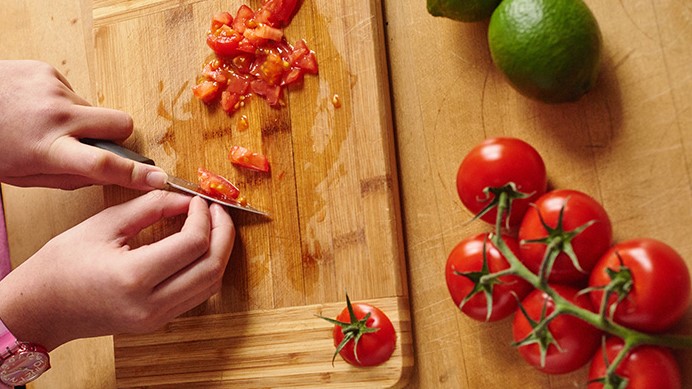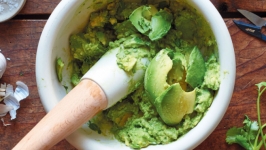Kids in the Kitchen
Cooking is not hard, but we all do start at the beginning. The more you practice, the better you get. Just keep that in mind, and don’t get frustrated when a recipe isn’t going the way you think it should, because everyone makes mistakes. Be patient, and ask for help when you need it.
You may already have some kitchen know-how—maybe you’ve helped bake cookies with friends or fixed yourself a homemade snack. Or maybe you’ve never picked up a pan in your life. That’s ok, too, because you can learn to become a pro in the kitchen.
As you find your own path to healthy eating, you’ll discover that people will have different ideas about what that means. My idea of healthy eating is preparing foods that have little to no processed ingredients, healthy fats (those fats feed our brains!), and plenty of fresh fruits and veggies. Balanced meals like these, with the occasional indulgence of homemade sweets, make for healthy and happy living.
First Things First: Shopping
Get inspired. If you come across a new or unusual food (for example, maitake mushrooms or celeriac) that draws your attention, give yourself permission to add it to your basket. Make a point of learning about it, and create a dish to highlight its delicious qualities.
Swap as needed. This is a pro move: Swap an ingredient for another like it that looks fresher at the market. Your recipe will turn out all the more flavorful for it.
Avoid overly processed foods. As much as possible, choose whole foods that are products of nature, not food products that have been processed in a number of ways, often loaded with preservatives, artificial colors and flavors, and added sugar. Read product labels carefully and investigate unfamiliar ingredients.
Choose fresher, better ingredients. Whenever possible, choose organic, fresh ingredients. Organic foods have no harmful chemicals applied to them while they grow, making them a healthier option.
Know your meat and fish. Get familiar with pasture-raised meats (which means the animals lived in their natural environment and ate their natural diet, instead of being confined to a cage and fed industrialized feed). These animals have been treated more humanely than their counterparts and will be healthier. For fish, opt for wild instead of “farm-raised.”
Find a farmers’ market. Farmers’ market foods are local and fresher by nature, and shopping there supports your local community. Farmers’ markets can also be a lot of fun! Farmers display their stands in unique ways, showing off the literal fruits of their labor. Feel free to ask questions, especially if they aren’t busy.
Minimize spoilage. Make the most of the food you bring home by using it in the order it was purchased. This is known as “first in, first out.” Check expiration dates on packages, and use foods expiring soonest.
9 Tips That Will Make You a Good Cook
1. Read the recipe. Read it again. Go through the steps of the recipe mentally before gathering your ingredients and tools to start cooking.
2. Stay organized. A well-prepped workspace, free of clutter, is a strong foundation for success in the kitchen.
3. Prep your ingredients. Measure and chop your ingredients before you begin cooking, and have them at your workstation, ready to go.
4. Clean as you cook. No one likes to deal with a mess after producing a delicious meal. Wiping own counters, clearing your cutting board, and disposing of nonessential items as you go will make a big difference at the end!
5. Taste, taste, taste. Taste the food early on as you begin to cook a recipe, and taste throughout as you add ingredients. Don’t wait until a dish is almost finished, because flavor is built up in layers. For dishes containing raw or undercooked meats or eggs, wait until they are fully cooked and then taste.
6. Be patient. A recipe doesn’t always work out perfectly the first time, and that’s ok. Making a less-than-perfect dish will teach you some lessons, and the next time you try it, you can apply what you learned to handle it more skillfully. You’ll also get the satisfaction of knowing you stuck with it!
7. Pay attention. What does the food you’re cooking smell like? What does it look like? How does it sound? Sometimes seconds make the difference in the success or failure of a meal. Focusing will help you save food from burning or becoming too tough or dry, and will help protect you from any cuts or burns.
8. Use fresh ingredients. While fresh fruits and vegetables are an important part of a delicious dish, so are fresh herbs and toasted spices: They can transform a so-so meal into one that sings with their bright, aromatic qualities.
9. Watch others. The more you study the people you admire and how they cook—as well as what they cook—the more you will absorb and the broader your own skill set will become
From Kid Chef: The Foodie Kid’s Cookbook by Melina Hammer, Sonoma Press, 2016.









